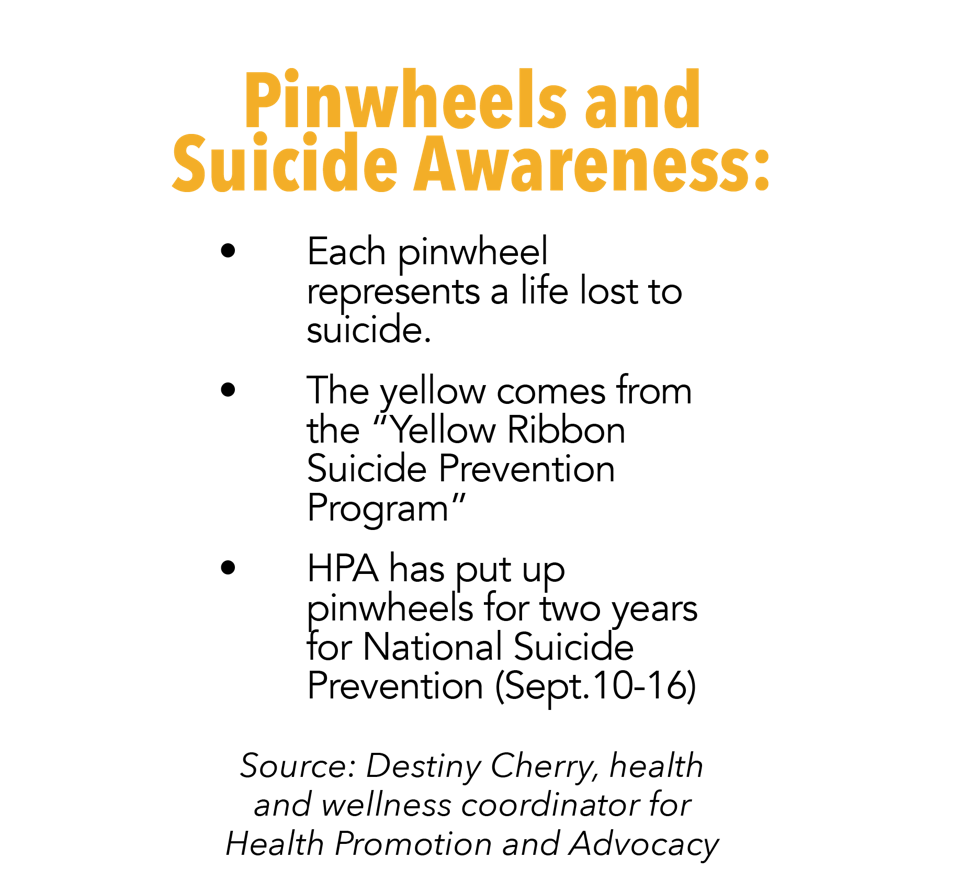Trigger Warning: This article mentions suicide.
Editor’s Note: Hannah Amos is a patient of the Ball State Counseling Center, however, she did not participate in the interview with professionals from the center.
September is Suicide Prevention Awareness Month. According to the Centers for Disease Control and Prevention(CDC), there were 49,449 deaths by suicide in 2022. In 2021, there were 1.7 million suicide attempts reported by the CDC.
The National Action Alliance for Suicide Prevention (NAASP) and the 988 Suicide & Crisis Lifelinesuggest five steps to help support those considering suicide.
Ask & Listen
The point of asking is to open the door of communication.
Aubrey Driscoll, Ball State University Counseling Center’s associate director for Prevention & Wellness, talked about the “myth” that talking with someone about suicide will make them think about suicide.
“The fact … is many people who think about suicide are relieved when people ask about it, because they’re scared to bring up what feels like a taboo topic,” she said via email. “Asking people if they’ve thought of killing themselves gives them the opportunity to share how they’re feeling and be directed to professional support.”
Be There
Supporting someone can happen in many different forms, according toNAASP and the 988 Suicide & Crisis Lifeline.
Being there for someone, whether physically or over the phone, is making a commitment and creating a support system for the person in need. However, it’s important to never make a promise about what you can or cannot do.
The act of simply being there for someone and lending a listening ear and providing reassurance is proven to be lifesaving. According to the CDC, the feeling of connection has been shown to be a “protective factor against suicide.”

Help Keep Them Safe
After asking the hard question of if someone is feeling suicidal, it’s important to be on the same page and see how imminent the danger is. According to the CDC, “reducing a suicidal person’s access to lethal means is an important part of suicide prevention.”
According to the NAASP and the 988 lifeline, the more set of a plan the person in need has in place, the higher the severity of risk and capability of enacting their plan.
If you feel like the person in need is so unwell they need immediate medical attention, there are options for who to talk to. You can reach out to a Resident Assistant at Ball State if the person lives in a dorm, the University Police Department if they live on campus or simply call 911 or 988.
Help Them Connect
Knowing the resources available for those in crisis is important, Driscoll said via email. Connecting people to resources can give them safety nets for when they have a crisis.
Ball State’s Counseling Center is open from 8 a.m. to 5 p.m. Monday through Friday and is free for Ball State students. Another option is calling Ball State’s new 24/7 Crisis Line at 765-285-HOPE (4673).
Other options the Counseling Center has are the app WellTrack, Togetherall— a peer-to-peer support platform— the Counseling Center’s social mediaand the Canvas-based program, Self-Care 101.
For off-campus, you can call 988, Open Door Health Services, Ball State’s Counseling Practicum Clinic, or you can find support in community groups, such as Muncie OUTReach, local churches, or National Alliance on Mental Illness Delaware County.
Follow Up
After a person is connected to proper support systems, it’s good to follow up with them. This follow-up could look like inviting them for coffee or sending a simple text.
Following up helps to continue the feeling of connectedness that was established in the “Ask & Listen” stage and the “Be There” stage. According to a National Library of Medicine study, maintaining contact and following up with a person is a preventative measure against suicide.
Contact Hannah Amos with comments at hannah.amos@bsu.edu or on X @Hannah_Amos_394. Contact Ella Howell with comments at ella.howell@bsu.edu.


